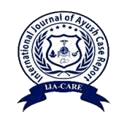Ayurveda Management of Kampavata with special reference to Parkinson’s Disease- A Single Case Study
Abstract
Parkinson’s disease is a progressive degenerative neurological disorder which mainly affects the motor system of body and it is characterized by resting tremors, slowness of movements, rigidity, gait disturbances/postural instability. It is correlated with Kampa Vata [Disease associated with tremors in body] in Ayurveda, [Indian ancient science for healthy life] as it is characterized by Sarvanga Kampa / Shiro Kampa [tremors all over body or tremors in head]. It is a Vata Vyadhi [principal element of body which caused diseases] which occurs due to pathological increase of Chala Guna [Moving property] of Vata. [Principal element of body] Treatment consists of both internal and external administration of different forms aimed to reverse pathology of Vata imbalance. Here, a case of 57 years male patient presented with tremors in both hands and neck, unable to walk without support since 12 years. Patient was treated with Panchakarma therapies; like Sarvanga Abhyanga, [External oil massage] Nadi Sweda, [sudation theorapy] Shiro Abhyanga [Head massage], Shiro Pichu [Oil soaked cotton pad putting on head] and Shiro Basti [Retension of oil on head] and Shamana Aushadhis like Tab Vatachintamani Rasa, Kapikachu Beeja Choorna [Mucuna pruriens], Ashwagandha Choorna, [Withamnia somnifera] Cap Ksheerabala 101, Avipatikara Choorna for 1 month. The patient got remarkable relief in symptoms with above Panchakarma and Ayurveda medicines.

This work is licensed under a Creative Commons Attribution-NonCommercial-NoDerivatives 4.0 International License.

